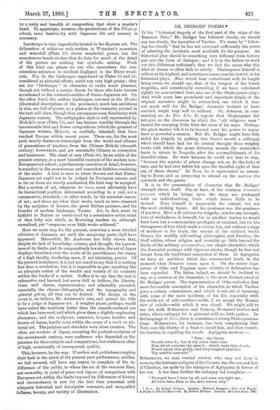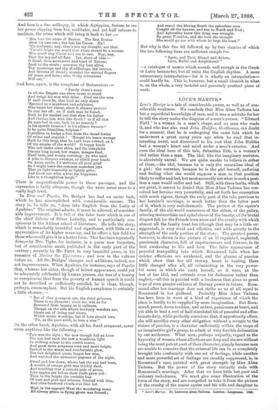DR. BRIDGES' POEMS.*
IN his " historical tragedy of the first part of the reign of the
Emperor Nero," Dr. Bridges has followed closely, we should say too closely, the narrative of Tacitus. We mean by " follow- ing too closely" that he has not exercised sufficiently the power
of selecting the incidents most available for his purpose. Au historical play should be something very different from history put into the form of dialogue ; and it is in the failure to work out this difference sufficiently that we find the cause why this kind of drama so often fails to satisfy. Shakespeare himself is seldom at his highest, and sometimes comes near his lowest, in his historical plays. Nero would bear curtailment well, its length being twice, we should say, that of the longest of the Greek
tragedies, and considerably exceeding, if we have calculated rightly its unnumbered lines, any one of the Shakespeare plays. And while some less prominent and important details of the original narrative might be retrenched, one which it does not speak well for Dr. Bridges' dramatic instinct to have omitted, might very well b3 utilised. Dr. Johnson, in com-
menting on As You Like It, regrets that Shakespeare did not give us the discourse by which the "old religious man" turned the usurping Doke from the error of his ways. Perhaps
the great master felt it to be beyond even his power to repro- duce so powerful a sermon. But Dr. Bridges might have fitly ended his tragedy by putting into Nero's mouth a soliloquy which should have had for its central thought those weighty words with which the great historian records the matricide's haste to return to Neapolis, after the accomplishment of his dreadful crime. He went because he could not bear to stay, " because the aspects of places change not, as do the looks of
men, and he had ever before his eyes the dreadful sight of that sea, of those shores." In Nero, he is represented as return- ing to Rome, and as purposing to attend on the morrow the spectacle and the games.
It is in the presentation of character that Dr. Bridges' strength shows itself. Six, at least, of the nineteen dramatis personce which he brings upon the stage are portrayed with an individualising force which leaves little to be desired. Nero himself is necessarily the central, but not the most striking figure. All his greatness was the greatness
of position. He is a fit subject for tragedy ; not for any strength, even of wickedness, in himself, for in another station he would
have been but a commonplace profligate or criminal, but for the strangeness of fate which made a vicious boy, not without a tinge of madness in his brain, the master of the civilised world. Seneca, the worldly self-seeking philosopher, and Burrhus, the bluff soldier, whose religion and morality go little beyond the limits of the military sacramentum, are simple characters which the dramatist portrays with vigorous stroke, though he does not depart from the traditional conception of them. In Agrippina
we have an ambition which has overreached itself, in the moment when Nemesis comes upon it. On the minor char- acters of Otho and Poppaea more subtlety of delineation has been expended. The latter, indeed, we should be inclined to say, as a creation of the dramatist, is the most distinct proof of Dr. Bridges' power. The representation of Otho embodies that more favourable conception of his character, to which Tacitns gives a certain countenance, and which is not out of harmony with some of the main incidents of his life, especially with the noble act of self-sacrifice—noble, if wo accept the Roman view of suicide—with which it was closed. We might add to
our list both Britannicus and Octavia, ill-starred brother and sister, whose unhappy lot is pictured with no little pathos. In the language of Nero, there is sometimes a strong Shakespearean tinge. Britannicus, for instance, has been complaining that Nero uses the liberty of a feast to insult him, and then resents
his freedom in repelling the insult. Agrippina answers :-
" True : the liberty
Should cover it ; but in thy veins there runs That which outcries thy speech ; which, wert thou dumb, Would speak thee guilty, and fiery-tongued proclaim
Thy needful sentence."
Britannicns, we may remind readers who may not keep in memory the intricate pedigree of the Cmsars, was the son and heir of Claudius, set aside by the intrigues of Agrippina in favour of her son. A few lines further the unhappy lad complains :-
"Wronged have I been by all, and none can right me, All have been false to me, save sorrow only."
• NM. By Robert Bridges. London : Edward Bump:ie.—Eros and Psyche. A Poem in Twelve Measures. By Robert Bridges. London : Bell and Bons. MS.
And here is a fine soliloquy, in which Agrippina, furious to see her power slipping from her, meditates, and yet half refuses to meditate, the crime which will bring it back to her :—
" Men love the name of Brutus. The first Brutus Slew his own son ; the last his Co:33er. Ha!
'Tis madness ; nay, that's not my thought, not that. 'Tivould fright the world that there should be a woman Who could slay Cmsar and son in one. Nay, nay, That lies beyond all fate. Yet, short of that- () blood, thou sacrament and bond of Nature, Look to the strain ; summon thy best allies, Thy yearnings and thy shudderings, thy terrors, And dreams of dread ; marshal the myriad fingers Of scorn and hate; else, 0 thy rottenness Will out."
And here, again, is the complaint of Britannicus
" Surely there's none
In all the Empire can show cause to stand And weigh his woe with mine. Find me the man If such there be, that hath an only sister 'Spoused to a murderer and adulterer, Who hates her virtue, since it shames pretext To cast her off : or, if such man be found, Huth he for mother one that slew his father And threats him with like death ? or if all this Be matched in one, bath he no remedy ? Is his speech treason ? is his silence treason ?
Is he quite friendless, helpless ?
Forbidden to budge a foot from the dread forms
Of crime and anguish ? 'Monget his leaser wrongs
Hath he this brag, that he bath been robbed, as I, Of the empire of the world ? 0 happy hinds Who toil under clear skies, and for complaint Discuss long hours, low wages, meagre food, Hard beds, and scanty covering : ye who trail A pike in German swamps, or shield your heads On Asian sands, I'd welcome all your grief So I might taste the common nameless joys That ye light-heartedly so lightly prize, And know not what a text for happiness Lies in a thoughtless laugh."
There is unquestionable power in these passages, and the expression is fairly adequate, though the verse never rises to a really high level.
In Eros and Psyche, Dr. Bridges has had an easier task, which he has accomplished with considerable success. The story is, he tells us, " done into English from the Latin of Apuleins." The original admits, it must be allowed, of consider- able improvement. It is full of the false taste which is one of the chief defects of Silver Latinity, and is particularly con- spicuous in the African school of literature. He tells the story, which is remarkably beautiful and significant, with little or no appreciation of its higher meaning, and he offers a fair field for those who would give it in a better form. This has been repeatedly done,—by Mrs. Tighe, for instance, in a poem now forgotten, but of considerable merit, published in the early part of the century ; recently by Mr. Pater, in very beautiful prose, in his romance of Marius the Epicurean ; and now in the volume before us. All Dr. Bridges' changes and additions, indeed, are not improvements. When Apnleins, for instance, says of Psyche that, whereas her sister, though of fairest appearance, could yet be adequately celebrated by human praises, she was of a beauty so conspicuous that from the poverty of human speech it could not be described or sufficiently extolled, he is clear, though, perhaps, commonplace. But his English paraphrase is certainly a little obscure :—
" But of that youngest one, the third princess, There is no likeness ; since sho was as far Removed from beauty as is ugliness,
Though on the side where heavenly wonders are, Ideals out of being and above,
Which music worships, but if love should love, 'Tie, as the poet saith, to love a star."
On the other hand, Apuleins, with all his florid ornament, never wrote anything like the following :-
"Fair was the sight ; for now though full an hour
The sun had sank she saw a wondrous light In shifting colour to the zenith tower, And grow more gorgeous ever and more bright.
Bathed in the warm and comfortable glow,
The fair delighted queen forgot her woe, And watched the unwonted pageant of the night.
Broad and low down, where last the sun had been, A wealth of orange gold was thickly shed, And touching that a curtain pale of green, Like apples are before their rinds grow red : Then to the height the variable hue Of rose and pink and crimson freaked with blue, And olive-bordered clouds o'er lilac led.
High in the opposed West the wondering moon All silvery green in flying green was fleeced ; And round the blazing South the splendour soon Caught all the heaven, and ran to North and East ; And Aphrodite knew this thing was wrought By great Poseidon, and she took the thought She would go sue with whom he kept his feast."
But why is this fine bit followed up by two stanzas of which the two following lines are sufficient sample P-
" Speio, and Thoe, Glance and Actaan, Iaira, Melite and Amphinome."
—a catalogue of names which sounds well enough in the Greek or Latin hexameter, but ill snits the English rhythm. A more unnecessary interpolation—for it is wholly an interpolation— could hardly be. This is, however, but a small blemish in what is, on the whole, a very tasteful and genuinely poetical piece of work.



































 Previous page
Previous page